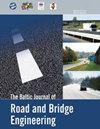Road Pavement Condition Index Deterioration Model for Network-Level Analysis of National Road Network Based on Pavement Condition Scanning Data
IF 1.1
4区 工程技术
Q4 ENGINEERING, CIVIL
引用次数: 0
Abstract
Surveying the condition of the pavement is one of the most important processes in managing the road network. The information collected during these surveys allows for the calculation of the Pavement Condition Index, which is a derivative cumulative qualitative indicator that evaluates various pavement characteristics and defects. Deterioration modelling of these measured indicators and calculated indices is a critical element and its most accurate prediction brings the process of pavement management closer to a higher quality process by more efficiently allocating funds and repair work. Many different models – both extremely complex and simple – are used in the world to simulate the condition of individual pavement indicators. However, these models are developed based on the data of a certain country or region and are not suitable in another country due to different requirements for pavement structures and other reasons. In Lithuania, measurements of the quality indicators of road surfaces with new generation survey equipment have been carried out recently but the information stored in the databases about road sections is minimal, and it becomes difficult to adapt the models applied abroad due to the missing information. The aim of this study is to create pavement condition index prediction models by evaluating such quantitative and qualitative indicators as traffic loads, road surface unevenness, type of repair, pavement age, climatic zones, and pavement construction classes.基于路面状况扫描数据的全国路网路网网级分析路面状况指标劣化模型
路面状况的测量是道路网管理中最重要的过程之一。在这些调查中收集的信息可以用于计算路面状况指数,这是一个衍生的累积定性指标,用于评估各种路面特征和缺陷。这些测量指标和计算指标的退化建模是一个关键因素,其最准确的预测通过更有效地分配资金和维修工作,使路面管理过程更接近于更高质量的过程。世界上有许多不同的模型——既有极其复杂的,也有简单的——被用来模拟单个路面指示器的状况。但是,这些模型都是根据某一国家或地区的数据开发的,由于对路面结构的要求不同等原因,并不适用于另一个国家。在立陶宛,最近使用新一代测量设备对路面质量指标进行了测量,但数据库中存储的路段信息很少,由于信息缺失,难以适应国外应用的模型。本研究的目的是通过评价交通荷载、路面不平度、修复类型、路面年龄、气候带、路面施工等级等定量和定性指标,建立路面状况指数预测模型。
本文章由计算机程序翻译,如有差异,请以英文原文为准。
求助全文
约1分钟内获得全文
求助全文
来源期刊
CiteScore
2.10
自引率
9.10%
发文量
25
审稿时长
>12 weeks
期刊介绍:
THE JOURNAL IS DESIGNED FOR PUBLISHING PAPERS CONCERNING THE FOLLOWING AREAS OF RESEARCH:
road and bridge research and design,
road construction materials and technologies,
bridge construction materials and technologies,
road and bridge repair,
road and bridge maintenance,
traffic safety,
road and bridge information technologies,
environmental issues,
road climatology,
low-volume roads,
normative documentation,
quality management and assurance,
road infrastructure and its assessment,
asset management,
road and bridge construction financing,
specialist pre-service and in-service training;

 求助内容:
求助内容: 应助结果提醒方式:
应助结果提醒方式:


